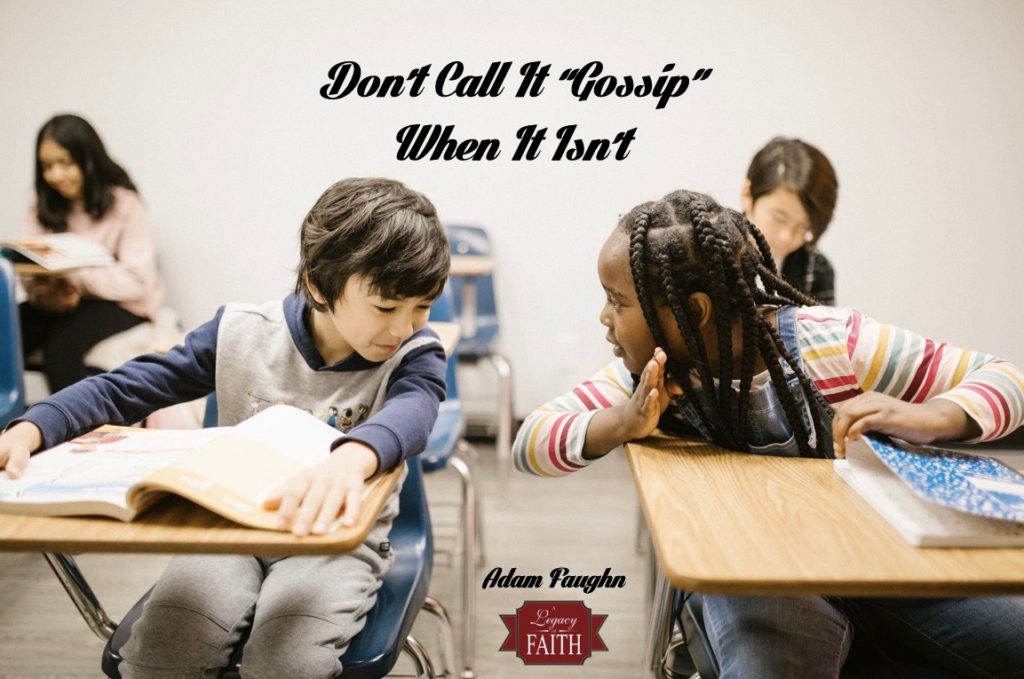Don’t Call It “Gossip” When It Isn’t
Gossip is evil. It is insidious. It subverts relationships. It tears groups of people–sadly, even sometimes congregations–apart. So, this post is not saying that gossip is no big deal!
However, the word “gossip” is sometimes used to describe things as a way to accuse people of something that is horribly wrong when what is going on may not be gossip. In other words, we need to be supremely careful about accusing someone of this sin.
What are some ways the word “gossip” is thrown around, when what is going on may not be that sin? Here are a few things that are sometimes called gossip that may or may not be:
Disagreement. I am amazed at how many people think that, if someone disagrees with them, that is gossip. Just because someone disagrees with you doesn’t mean they are committing a sin. In fact, many of our best conversations and ideas center around people disagreeing and working through those issues instead of lobbing accusations at each other.
Talking About Someone Who Is Not There. Can this be gossip? Of course it can. In fact, this is typically what we think of when we think of gossip, and it can be very dangerous. However, is it always gossip? No! How do I know that? Because even Jesus talked about people who were not actually present to hear His words (see Luke 13:32 for just one example). What makes it gossip is if we say something about that person that (1) is untrue/unfair, (2) we would not say in their presence, and/or (3) we are not seeking to find a way to approach that person fairly at a later time.
Being Angry with Someone. This is similar to disagreement, but also deals with the emotions involved. A person can be angry with another and even speak in very strong tones without it being gossip. At times, it can actually be helpful for another to hear in someone’s impassioned voice that there is an issue.
As I said at the start, this post is not meant to downplay the seriousness of gossip. It is a real problem, and it is a sin. However, we also do not need to make it out to be things that it is not.
So, what is it? If those things are not necessarily gossip (although they could be in some cases), what is?
The word translated “gossip” in the New Testament basically has the simple meaning of “idle talk.” It is talk that does not serve a higher purpose but, rather, a lower purpose. It is being careless with our words.
So, could disagreement be gossip? Yes, if I do not use that disagreement to seek to better things.
Could talking about someone who is not there be gossip? Absolutely, if I am not saying something to point out a truth that could help a situation and am, instead, simply seeking to run someone down.
Could being angry be gossip? Well, it could lead me to being tempted to gossip, just because I want to make someone look worse than they actually are.
The point of avoiding gossip–avoiding idle talk–is to remember what Jesus said about how serious this is: “I will you, on the day of judgment people will give account for every careless word they speak” (Matthew 12:36).
Before speaking (or typing), ask yourself if this word is well-chosen for a higher purpose. If not, it’s better left unsaid, because it likely is gossip. However, before you accuse someone else of the horrible sin of gossip, you need to be totally sure they are actually committing that sin. If they are not, and you are careless in making that accusation, there is a danger that you could be gossiping yourself!
Receive all our posts for free:
AUTHOR: Adam Faughn



